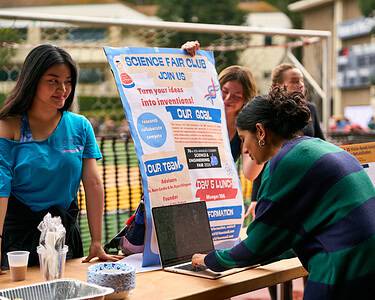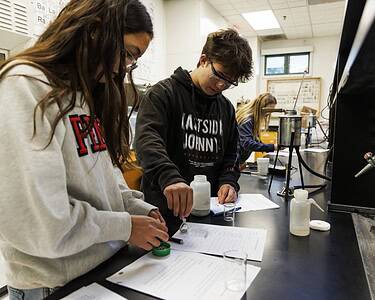By Andrew ’22
Do machines think, and is self-awareness necessary for thought? Why do we feel the need to be polite when talking to Siri or Alexa? Can we confidently differentiate between poetry written by an AI program from human-written works? And why are these questions important?
Widespread personal automata, the emergence of an AI consciousness, and bio-engineered organisms are no longer distant fantasies found only in the science-fiction worlds of Asimov and Herbert; they are approaching realities. Analyzing psychological and social reactions to the development of these technologies using both historical and fictional examples is important to understanding such a future. This investigation is at the heart of Nature and Artifice, a Directed Studies course at the Upper School.
Directed Study classes are opportunities for students to delve into interdisciplinary topics not covered in traditional classes. Course offerings are diverse, and students can explore fields of study as contrasting as the graphic design of social movements and analysis of video games. An important goal of the Directed Studies program is introducing material that is not only interesting but also relevant to students’ interactions with the world. For example, the Directed Studies department created an entirely unique course on the 2020 presidential election that was only offered this semester. Also, if students discover an area of study they would like to pursue, they can make a proposal for the creation of an entirely new Directed Study. These classes meet two designated times each cycle, and the new schedule allows students to take a Directed Study without interfering with any of their other course selections.
As an avid science-fiction fan, I was drawn to Nature and Artifice while reading through the curriculum guide earlier this year. Discussing the complexities of being human when the definition of humanity is continuously challenged by technology seemed to be right up my gloomy dystopian alley. My excitement only grew once the class started. We started by examining the history of automata, starting with the first hydraulic machines of the 17th century that could move their limbs and even play tunes on a pipe. In addition to these machine’s whimsical purposes, I was fascinated by the eerie extent to which they mimicked human life; for example, the “Pipe Player” contained its own pair of lungs and system of facial muscles. Accompanying the introduction to these early machines were philosophical texts from contemporary thinkers, such as Descartes, who pondered whether human existence could be viewed as a complex biological machine or if the unique component of the soul existed. Our class then focused on the Industrial Revolution and its Romantic-Gothic reactions to consider if humanity should place limits on relentless scientific ambition.
Once the material transitioned into the 20th and 21st centuries, I truly began to appreciate the interdisciplinary nature of the course. Some classes, we would watch films such as Georges Melies’s shorts and the Blade Runner series to discuss how this mechanization of the living human image both intentionally and unintentionally reveals the amplification of prejudice and oppression by technology. During other classes, we would use literary analysis of science fiction classics – such as Karl Capek’s “RUR” play (the first work to use the term “robot”) – to examine these themes. We also continued to read psychological thought experiments and put them to the test. My favorite is Alan Turing’s “Imitation Game” experiment, where a computer’s faculty of thought is measured by its ability to pose as a human being lying about their identity. During one of our meetings last week, my classmates and I staged this evaluation for ourselves in order to gain more insight on what qualities a robot would need to possess to pass the test.
My awesome experience with the Nature and Artifice course has shown me how exciting it is to apply critical thinking skills developed in traditional subjects to a wholly new arena.





